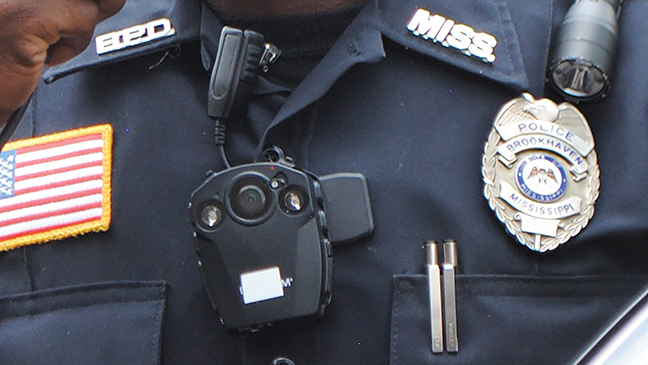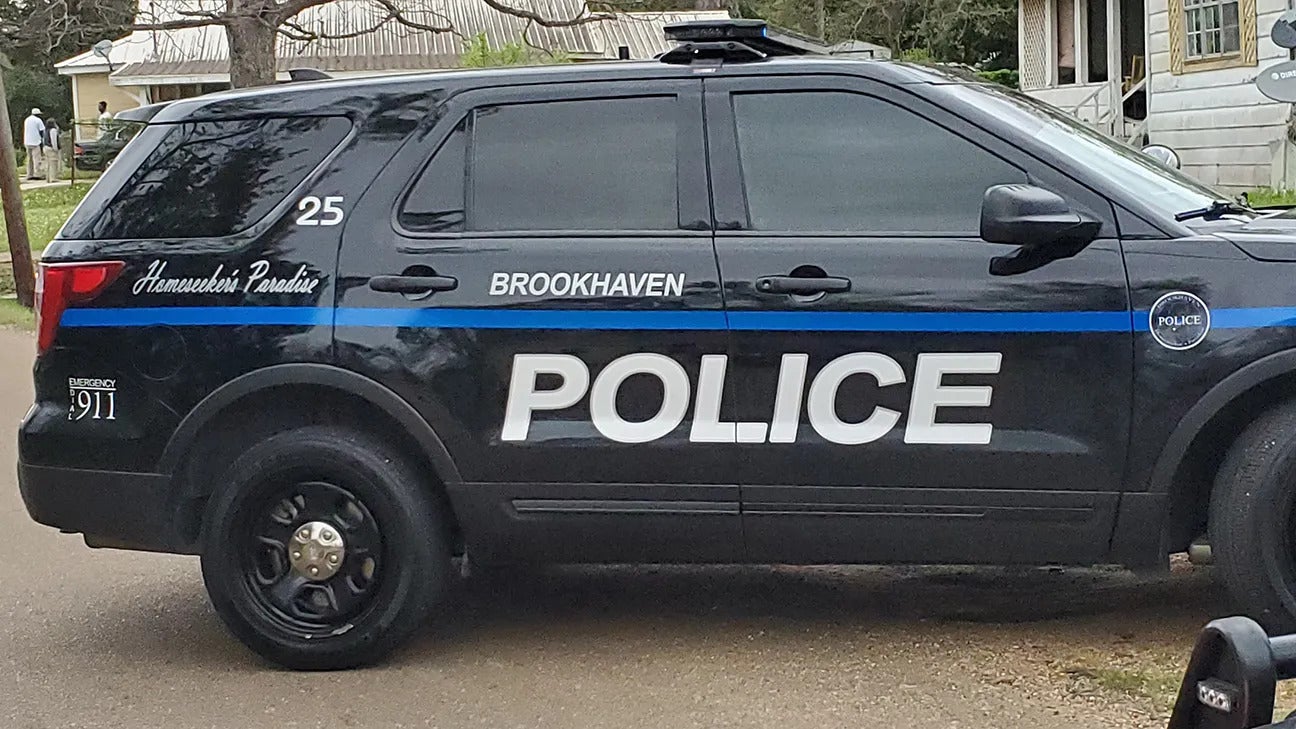Police body camera footage shielded from the public eye
Published 10:16 pm Friday, September 28, 2018

- A Brookhaven police officer’s body camera is shown.
Seeing is believing.
Ridgeland attorney James Priest Jr. wishes he could see video footage of the Brookhaven Police Department’s interaction with his client, James Earl Little Jr., on Christmas Eve 2016, and show it to the federal judge presiding over Little’s federal civil rights lawsuit against the City of Brookhaven and two police officers. The officers say Little became agitated, smelled of alcohol, refused to cooperate and resisted arrest — Little says he tried to comply when they grabbed him out of the blue, used profane language toward him and injured his wrist while cuffing him.
“If you compare what the officers say in their reports to the allegations of the complaint, you’ll see it’s obvious that body camera footage would likely resolve this case quickly,” Priest said. “Clear body camera footage would likely be the best evidence for resolving the conflicting stories.”
But BPD says no footage of Little’s arrest and subsequent release exists, even though the incident occurred several months after the department equipped body cameras and adopted a policy for their use. The policy only requires footage be kept for 90 days — Priest first gave the city notice Little intended to file the suit in October 2017 and filed in June 2018, so the department may have deleted the recording long before in a routine purging.
Or, the officers may not have recorded their interaction with Little in the first place.
BPD’s policy leaves the uploading and preservation of recorded video up to the individual officers and prohibits releasing recordings for “non-law enforcement purposes.” The Daily Leader made public records requests to review footage form Little’s interaction and three other arrests from summer 2018, but was told Little’s footage doesn’t exist while the other three requests were denied, as were secondary requests for documentation required under the body camera policy.
Brookhaven police may or may not be using body cameras accordingly, or at all. And there appears to be no way for the public to find out.
The desire to
remain silent
Zakiya Summers-Harlee, director of communications and advocacy with the American Civil Liberties Union of Mississippi, said the guarded nature of BPD’s body camera policy wasn’t what the ACLU had in mind two years ago when it worked with former Brookhaven Police Chief Bobby Bell to help draw up the policy.
“Our stance is that the public has a right to know what’s recorded on body cameras,” Summers-Harlee said. “The (body-worn camera) policy that we advocate for law enforcement agencies to adopt should err on the side of public disclosure. If consent from those involved is granted, then law enforcement agencies should release the footage. Not releasing is an attempt to avoid transparency and accountability.”
The Daily Leader requested footage of Little’s incident on Aug. 30, but on the last of the seven working days the state’s public records law allows for responding to public records requests, city attorney Joe Fernald responded that all such requests have to be filed with the city clerk’s office, not the police department. The city’s 30-year-old policy on public records requests makes no such requirement — it actually suggests filing records requests with “the respective agency.”
The newspaper refiled the request at both offices, and in the meantime filed another request seeking body camera footage from three arrests in August — LeRoy Clark Jr., who was surrounded by officers when mistaken for a wanted man on July 20; Jimmy Burks, who was nabbed for armed robbery on Aug. 14; and Thomas Marks, who was arrested for aggravated assault on Aug. 23. These new requests also sought written reports BPD’s body camera policy requires officers to write in the event a recording was not made, interrupted or terminated.
Fernald denied all three requests, saying police records are exempt under the state’s public records law.
But Leonard Van Slyke, a First Amendment and media law attorney who works with the Mississippi Press Association, said that’s incorrect.
“There’s nothing in the public records act that says all police records are exempt. That’s not true at all,” he said. “As a matter of fact, incident reports are specifically required to be given. And the statute specifically requires them to cite whatever reason they’re relying on to deny a request.”
The state’s public records law protects law enforcement officers’ personal information, investigative reports and internal affairs inquiries. BPD could claim video of the arrests of Burks are Marks are part of ongoing investigations, but any investigation into Clark’s arrest is over, or never happened at all — BPD Chief Kenneth Collins released him an hour after his arrest and later publicly apologized for the mixup.
The Daily Leader on Monday tried to get a paper copy of BPD’s body camera policy and got the run-around — the city clerk’s office said to ask BPD, BPD said to ask Fernald and Fernald required a public records request, which has yet to be answered.
But, the ACLU maintains a copy of Brookhaven’s and other cities’ body-warn camera policies online at https://tinyurl.com/y8efyasv.
Laws for the lawmen
The organization has tried for several years to get the Legislature to pass a law that normalizes body camera usage statewide, but so far as been unsuccessful.
“Used properly, body-worn video cameras can help deter police misconduct and uses of force, provide evidence to hold officers accountable when misconduct does occur, as well as exonerate wrongly accused officers, and help the public understand how police operate,” said Jennifer Riley Collins, executive director of the ACLU of Mississippi. “The lack of uniformity across the state makes it clear that the state must establish certain minimum criteria for policies governing the use of BWCs by agencies choosing to deploy them.”
District 63 Rep. Deborah Butler Dixon, a Democrat from Raymond, has been trying, too. In her first term in 2012, she was able to pass the “Broderick Rashad Danti Dixon Act,” which revises penalties for falsely reporting a crime and guarantees crime victims the right to receive copies of the incident report from police. The law is named after her son, who was killed by an off-duty police officer from another town in Birmingham, Alabama, in 2009.
In 2018, Dixon tried to pass House Bill 1069, which would have required every law enforcement agency in the state to equip body cameras before purchasing more police vehicles. The bill was double-referred — the legislative kiss of death — to the House appropriations and municipalities committees, where it died on a calendar deadline.
“Police body camera footage would clear the air, and turn injustice into justice,” Dixon said. “I’m trying to make sure I get bills passed that will bring justice on both sides. I think all police should have body cameras, and I think it should be open to the public. Right now, about the only way to get the footage is if a lawyer asks for it in discovery.”
Dixon wasn’t alone in trying to force transparency onto Mississippi’s law enforcement agencies. Six other Democrats all authored bills dealing with police body cameras, all of which died on committee deadlines.
District 67 Rep. Earle Banks of Jackson tried House Bill 675, which would have prohibited police from using body cameras to recreate events for use as evidence and required any agency using cameras to adopt policies for their use. District 38 Rep. Cheikh Taylor of Starkville wrote House Bill 1323, which would have required sheriff’s departments to equip body cameras and spelled out penalties for failing to use them.
District 12 Rep. Willie Simmons of Cleveland authored House Bill 2373, “the Community Policing and Transparency Act,” a detailed policy intended for use statewide. The same act was tried by two different senators — District 16 Sen. Angela Turner-Ford of West Point and District 12 Rep. Derrick T. Simmons of Greenville.
Banks said footage from police body cameras should be considered public record, subject to public records requests and given to the public in a timely fashion. He said releasing body camera footage would not only protect citizens from wrongful accusations, but would also protect police departments and law enforcement officers from the same.
“Just like Brookhaven, being sued — it’s simply to say everything is kosher, everything is right. Then why shouldn’t it be reviewed by the public?” Banks said. “What the public should want to have, what the leadership of our police departments and our cities and counties should want to have, is transparency. To me, it’s the way our society needs to go, so we don’t have all the old, dark secrets you would hear about in the time of civil rights. It’s time for a change in the way law enforcement is perceived by the community.”
Test case
So far, public access to body cameras is a little-fought issue. The ACLU says only 48 of 146 law enforcement agencies in Mississippi use body cameras, and footage is often released only under threat of lawsuit, an option every-day citizens can’t afford.
The Daily Leader is filing a complaint with the Mississippi Ethics Commission over the city’s refusal to release body camera footage or the required officer reports explaining why footage was not captured. Van Slyke said the commission has yet to establish an opinion on body camera footage, adding the newspaper’s complaint may not be “a slam dunk.”
“The commission will have to face this sooner or later. They’re aware of it, they’re concerned about it and they don’t know what to do about it,” he said. “The complaint may be the commission’s test case.”
Messages left with Collins and all seven Brookhaven aldermen were not immediately returned.




